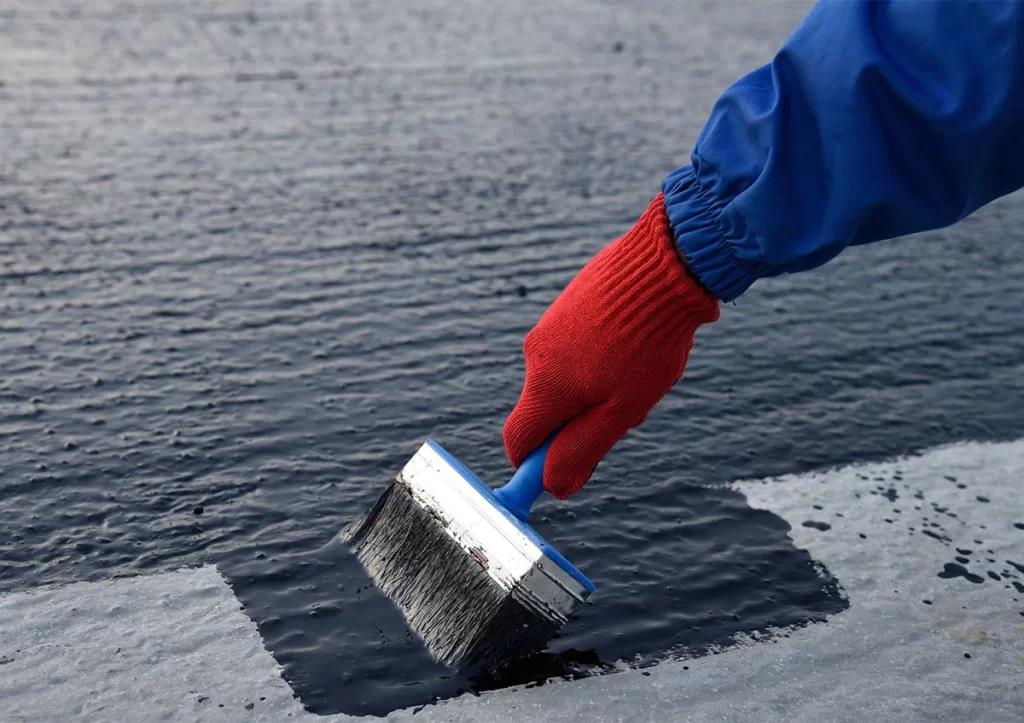
Waterproofing chemicals are substances used to protect surfaces and structures from water penetration, preventing moisture-related damage and maintaining the integrity of the materials. Waterproofing chemicals create a barrier that repels water and prevents it from seeping through. Various types of waterproofing chemicals are available, each with its own composition and application. Here are some common types and their key features:
- Bituminous Waterproofing: Bituminous waterproofing chemicals, such as bitumen or asphalt-based compounds, are widely used for waterproofing roofs, foundations, and below-grade structures. They form a thick, flexible, and durable barrier that is resistant to water penetration.
- Cementitious Waterproofing: Cementitious waterproofing chemicals are based on cement or cement-like materials. They are typically applied as coatings or membranes to concrete surfaces, providing a protective barrier against water. They can be used on roofs, walls, and basement structures.
- Polyurethane Waterproofing: Polyurethane-based waterproofing chemicals are highly flexible and elastomeric. They are commonly used for areas that require a high degree of movement, such as joints, expansion joints, or surfaces subject to thermal expansion and contraction. Polyurethane coatings can be applied on roofs, balconies, and other exposed surfaces.
- Acrylic Waterproofing: Acrylic waterproofing chemicals are water-based coatings that form a protective barrier when applied to various surfaces, including concrete, masonry, and wood. They provide excellent UV resistance and can be used on roofs, walls, and balconies.
- Silane/Siloxane Waterproofing: Silane/siloxane waterproofing chemicals are penetrating sealers that impregnate the substrate and form a hydrophobic barrier. They are commonly used for masonry surfaces, such as brick or stone, and provide excellent water repellency while allowing the material to breathe.
- Bentonite Waterproofing: Bentonite-based waterproofing chemicals utilize the properties of sodium bentonite clay, which swells when exposed to water, creating a watertight barrier. They are often used in below-grade applications, such as foundation walls or tunnels.
- Liquid Rubber Waterproofing: Liquid rubber waterproofing chemicals are elastomeric coatings that can be applied as a liquid and cure to form a seamless, rubber-like membrane. They are used for a variety of applications, including roofs, decks, and basements.
- Epoxy Waterproofing: Epoxy waterproofing chemicals provide a highly durable and chemical-resistant barrier. They are commonly used in areas subjected to chemical exposure, such as industrial floors, tanks, or wastewater treatment facilities.
Why Choose AERO CONCHEM LLP for Waterproofing Chemicals?
When you choose AERO CONCHEM LLP for your waterproofing chemical needs, you’re selecting a partner dedicated to excellence, durability, and reliability:
- Quality Assurance: Our waterproofing chemicals are manufactured to the highest quality standards, ensuring consistent and reliable performance.
- Expert Guidance: Our experienced team is available to assist you in selecting the right waterproofing chemical for your project, providing guidance and support from start to finish.
- Competitive Pricing: We offer cost-effective solutions without compromising on quality, making our products a wise investment for businesses and industries of all sizes.
- Timely Availability: Our waterproofing chemicals are readily available, ensuring you can access the materials you need when you need them.

